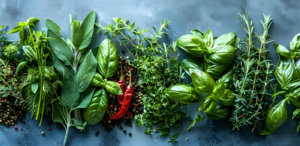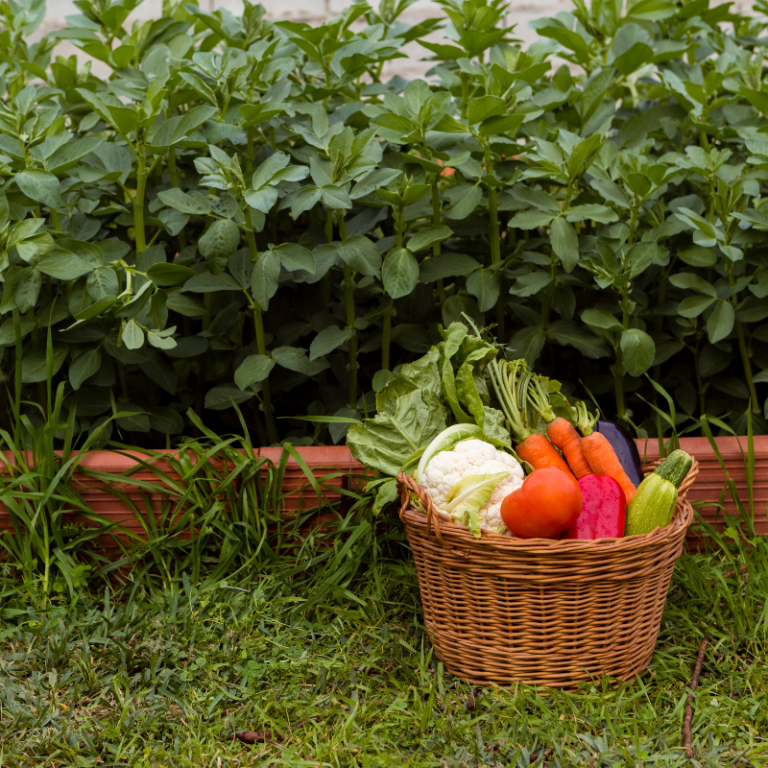Creating a thriving herb garden isn’t just about growing individual plants; it’s about growing the right plants together. Companion planting is a gardening method that maximizes growth, improves flavors, and deters pests. In this guide, we’ll explore what herbs to plant together and how to create a harmonious herb garden that benefits both your plants and your plate.
| Crop | Companion Plants |
| Asparagus | Basil, marigold, oregano, parsley, tomato |
| Beans | Corn, tomato, eggplant, carrot, cucumber, pumpkin, radish |
| Cabbage | Sage, dill, beet, peppermint, rosemary, corn, spinach, sunflower, nasturtium |
| Carrot | Onion, chive, rosemary, radish, nasturtium, cilantro |
| Celery | Onion, cabbage, tomato, bush bean, nasturtium |
| Corn | Beans, marigold, sunflower, cucumber, nasturtium, squash |
| Cucumber | Beans, dill, marigolds, radish, chives, zucchini, peas |
| Eggplant | Beans, marigold |
| Kale | Sage, dill, beet, peppermint, rosemary, corn, spinach, sunflower, nasturtium |
| Lettuce | Carrot, garlic, peas, radish, strawberry, onion, chive |
| Onion | Beet, carrot, lettuce, tomato, watermelon, eggplant |
| Peas | Apple, carrot, radish, raspberry, turnip |
| Pepper | Basil, garlic, onions, radish, nasturtium, cilantro, marigold |
| Potato | Basil, beans, corn, nasturtium, cilantro, marigold |
| Spinach | Strawberry |
| Squash | Beans, nasturtium, mint, radish, dill, basil, sunflower |
| Tomato | Basil, marigold, nasturtium, carrot, garlic, chive |
What is Companion Planting?
Companion planting involves growing herbs and plants that complement each other. The right combinations can deter harmful pests, improve soil health, and enhance the flavors of your harvest. For instance, pairing basil with tomatoes is a classic example of companion planting that works wonders in both the garden and the kitchen. For a deeper dive into how herbs can work with your vegetables, you can explore this Vegetable Companion Planting Guide.
When planning your garden, consider how herbs like oregano and chives act as natural pest repellents, while rosemary and sage provide a stronger aroma that deters insects. The benefits of pairing these herbs together go beyond their culinary uses—herb companion planting creates a natural ecosystem within your garden.
Best Herbs to Plant Together
Here are some of the most effective herb pairings to get started with companion planting:

- Basil
Best companions: Oregano, parsley, tomatoes.
Benefits: Repels whiteflies and aphids; enhances the flavor of tomatoes and peppers.- Ideal for growing near tomatoes for both pest control and taste improvement.
- Chives
Best companions: Dill, parsley, marjoram, and carrots.
Benefits: Repels aphids, beetles, and slugs.- Works well in salads or to scatter over soups for added flavor and protection.
- Dill
Best companions: Chives, lemon balm, and lovage.
Benefits: Attracts beneficial insects like ladybugs and deters tomato hornworms.- Be sure to plant away from cilantro to avoid cross-pollination.
For those looking for a chemical-free solution to keep their garden pest-free, consider exploring these Natural Pest Control Solutions.
Herbs to Avoid Planting Together
Not all herbs make good neighbors. Here are a few combinations to avoid:
- Mint and parsley: Mint tends to take over, crowding out more delicate herbs like parsley.
- Dill and cilantro: These two herbs can cross-pollinate, leading to undesirable growth outcomes.
- Fennel with other herbs: Fennel secretes compounds that inhibit the growth of many herbs and vegetables, so it’s best planted on its own.
Starting Your Own Herb Garden

Getting your herb garden up and running is simple if you follow a few essential tips:
- Choose the right location: Most herbs require 6-8 hours of sunlight per day, so select a sunny spot.
- Use the correct soil: Herbs prefer well-drained soil, so a mix of compost and garden soil works best.
- Planting methods:
- In traditional garden beds, space herbs according to their size. Larger herbs like rosemary need more room than smaller herbs like thyme.
- In containers, ensure that each pot has good drainage to prevent root rot. For layout ideas, check out these Herb Garden Planning Tips.
Benefits of Companion Planting for Growth
When herbs are planted together, they create a balanced ecosystem where plants can thrive. Here’s how companion planting boosts growth:
- Basil with tomatoes and peppers: Improves flavor and helps protect tomatoes from pests.
- Rosemary with cabbage: Repels cabbage moths and other pests while improving cabbage health.
- Oregano with beans and squash: Provides ground cover, which helps retain soil moisture and reduce weeds.
By planting herbs that benefit one another, you’ll not only enjoy healthier plants but also reduce the need for pesticides and fertilizers. Plus, the pollinators like bees and butterflies that visit your garden will also benefit.
Best Companion Herbs for Vegetables
Herbs aren’t just good companions for other herbs; they also work well with vegetables. Some great combinations include:
- Basil with tomatoes and peppers: Enhances growth and repels pests.
- Chives with carrots: Keeps carrot flies at bay.
- Rosemary with beans and brassicas: Deters harmful insects and promotes healthy plant growth.
Seasonal Planting Tips
Different herbs thrive in different seasons. Here’s a quick guide on when to plant your herbs:
- Spring: Basil, dill, and cilantro are perfect for spring planting.
- Summer: Opt for hardy herbs like oregano, rosemary, and thyme that thrive in the heat.
- Fall/Winter: Cooler weather is ideal for growing parsley, sage, and mint.
Rotating herbs based on the season can help ensure a year-round harvest.
FAQs: Companion Planting with Herbs
- What herbs should not be planted together?
Avoid planting mint with parsley and dill with cilantro due to their invasive and cross-pollinating tendencies. - What herbs grow well with basil?
Basil pairs well with oregano, parsley, and tomatoes, improving growth and flavor. - Which herbs grow best together in pots?
Herbs like oregano, basil, chives, and parsley do well together in containers since they have similar water and sunlight needs. - What herbs keep pests away?
Basil, rosemary, and chives are natural pest repellents, deterring insects like aphids, mosquitoes, and carrot flies. - What herbs are good for pollinators?
Herbs like lavender, oregano, and thyme attract bees and butterflies, supporting a healthy ecosystem.
Conclusion: Planting a Thriving Herb Garden
By thoughtfully selecting and planting herbs together, you can create a vibrant, pest-resistant, and productive herb garden. Whether you’re growing basil with tomatoes, chives with carrots, or rosemary with cabbage, companion planting enhances your garden’s health and your meals’ flavors.
